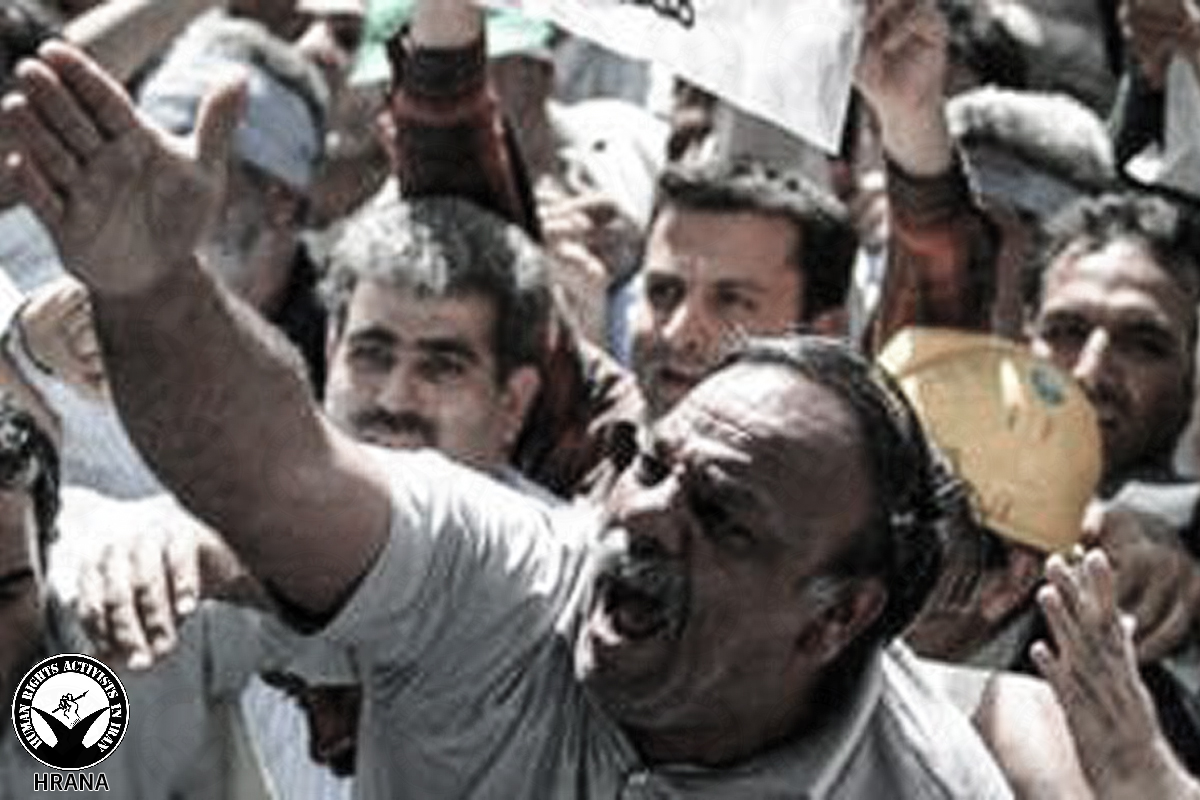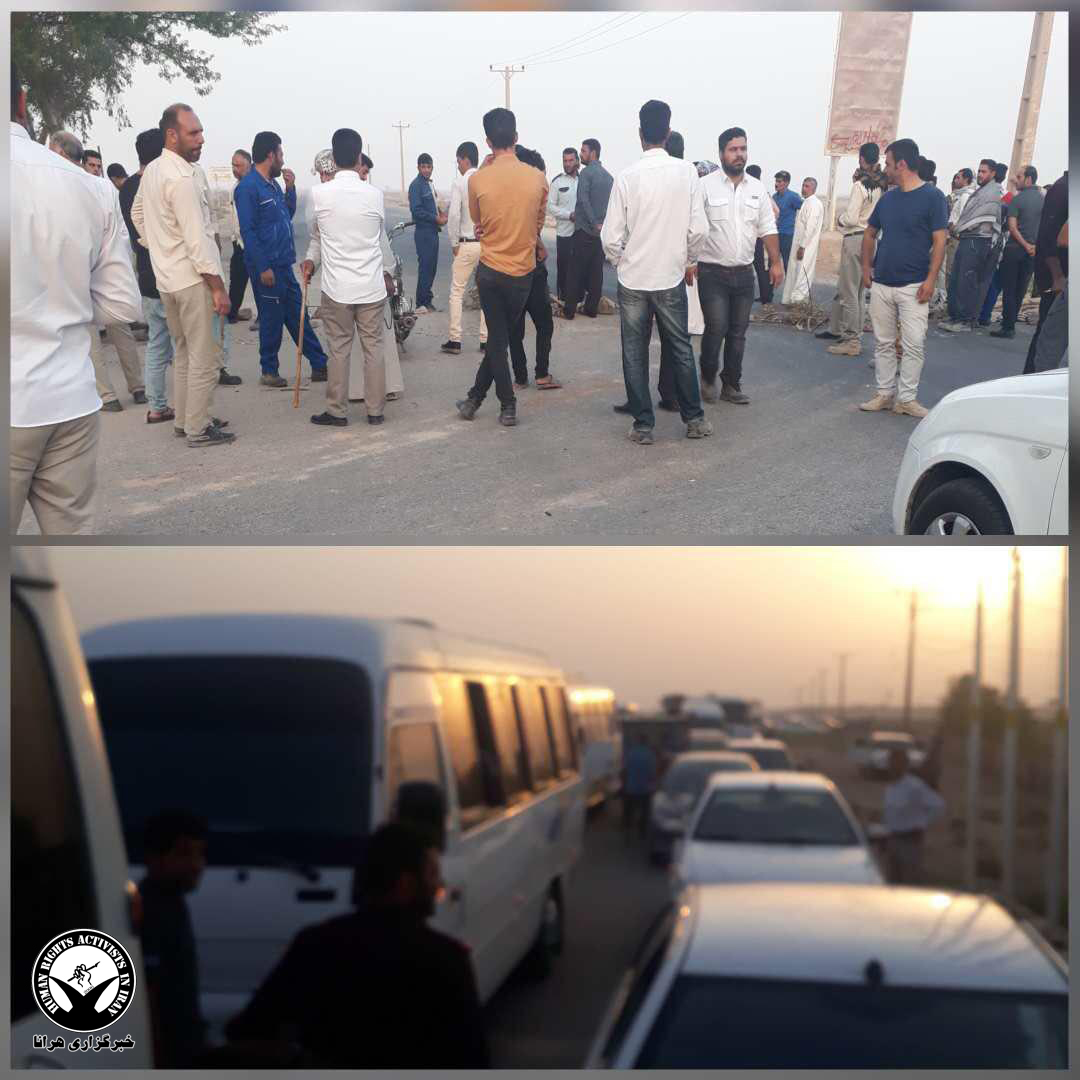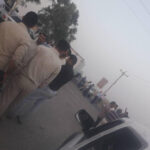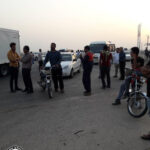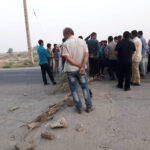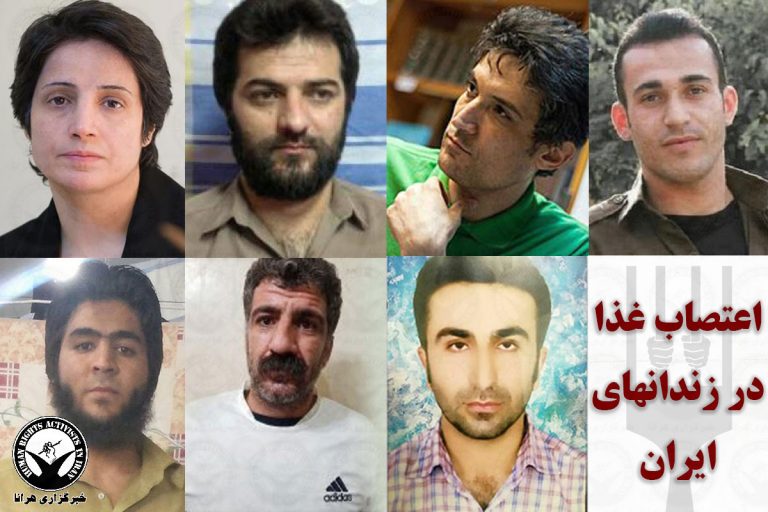Human Rights Activists News Agency (HRANA) – On August 26, 2018, Azerbaijani activist Hamid Saghati was released from Tabriz Prison after serving four months.
In June of 2016, HRANA published a report on the arrest and detention of Hamid Saghati and five others in the city of Ardabil. An informed source confirmed to HRANA that Saghati was among a group of six sentenced in November of the same year.
The others charged in the case were sentenced as follows: Babak Avand and Esmaeil Fakhimi, four months’ imprisonment; Mehdi Amirinejad, two years’ imprisonment; and Habib Sasanian, nine years’ imprisonment.
In late June 2016, the Head of the East Azerbaijan Judiciary called the group “members of the six-member GAMU spying team”.
Author: admin-hr
Zahedan Death Row Prisoner Now in Custody of the IRGC
Human Rights Activist News Agency (HRANA) – Abubakr Rostami, a political prisoner on death row, was transferred from Ward 4 of Zahedan Central Prison to an IRGC detention center on August 28, 2018. To date, HRANA is unable to confirm the reason for his transfer.
A source close to Rostami told HRANA, “A few days ago, prison authorities told Rostami he was not to use the library or gym, then on Tuesday they transferred him outside.”
Rostami was among a group of political prisoners in Zahedan who addressed a letter to UN special rapporteur Javaid Rehman, imploring him to advocate for political prisoners’ rights.
Prior to this, in an open letter co-written by Bandeh Chakerzehi and Sajjad Baluch — the two arrested with him on September 16, 2015– Rostami proclaimed their innocence, stating the IRGC and Intelligence Agency exerted physical and mental torture on them on charges that were “bogus”.
In the letter, Rostami wrote of the trip to Pakistan he was planning in anticipation of making arrangements for continuing his studies [abroad]: “Due to border limitations, I was forced to travel through Pakistan to get to [another] foreign country, but I was arrested midway and handed over to the IRGC,” he wrote.
A second-year medical student at Zabol University of Medical Sciences, Rostami has spent the past three years in prison. In August 2017, along with Chakerzehi and Baluch who were on trial for the same case, he was sentenced to death by the Revolutionary Court of Zahedan on charges of “Moharebeh” (enmity against God) and “Acting Against National Security through Cooperation with Opposition Groups”.
No further details on their case or charges were available.
*Zahedan is a county in the Sistan and Baluchestan Province.
Citing Empty Promises from Authorities, Industrial Strikers Persist
Human Rights Activists News Agency (HRANA) – Workers from the Iran National Steel Industrial Group (INSIG) in Ahvaz and the Haft Tapeh Sugarcane Agro-Business (HTSA) continue to mobilize around enduring contentions with their employers, including delayed wages.
August 29th marked the workers’ 12th day of consecutive striking and pressing for concessions from these two major industries in the southwestern province of Khuzestan.
“Us Haft Tapeh workers pay the price when incompetent managers mess up,” one Haft Tapeh worker told HRANA. “We’re not going anywhere, and if the managers have something to say, let them come and say it to all of us. What kind of murderers are we being taken for when managers who don’t come to work force us to go to Ahvaz?”
Hamid Zarif-Khasraj, head of the local unit of the Shush County welfare and Shush labor office, told HRANA that 6,000 workers are owed three months in back wages, while some of the sugarcane cutters have been working without pay for five. He said his department was “looking into the case” to ensure the latter group gets compensated.
HTSA workers recently learned from their insurance print-outs that their company had changed hands, Zarif-Khasraj said. Concerns over company outsourcing and privatization have been central to the workers’ demands.
According to the country-wide workers’ group Free Labour Union of Iran (FULI), the Shush County governor and other authorities met with workers’ representatives on August 28th. They wanted the strikers to go back to work, but didn’t offer concrete guarantees, FULI said.
When the Shush County governor delivered an address to the workers on Wednesday, in which he made similarly vague promises, he was met with more protests.
Steelworker protest in Ahvaz: Day 11
On August 29th, workers of Iran National Steel Industrial Group (INSIG) in Ahvaz continued their 11th straight day of gathering before Khuzestan’s provincial governorate in protest.
“INSIG is dying by the hands of Bank Melli [its owner],” and “death to the oppressor” counted among slogans being chanted by the workers.
INSIG has been at a detrimental shortage of raw material, stalling both production and worker payroll. The company’s CEO Kasra Ghafoori had previously promised raw material by August 28th.
INSIG is a conglomerate employing about 4,000 workers who have not been paid in months. Long wage delays are what sparked initial protests on Saturday, August 18th, where workers demanded payment of four months’ back wages and a renewal of INSIG’s raw material supply.
Concerns Mount over Fate of Tortured Kurdish Prisoner
Human Rights Activists News Agency (HRANA)- Mystery still shrouds the condition and fate of Farhad Abdollahpour, who was arrested on June 30, 2018, by IRGC Intelligence forces and has effectively been missing since July.
Abdollahpour’s family, from Oshnavieh in northwestern Iran, were able to visit him briefly after his arrest in the IRGC Intelligence Detention Center of Urmia. They reported seeing signs of torture on his body. Their subsequent inquiries into his current status and the reason behind his arrest have been left unanswered by Oshnavieh’s Judiciary and the IRGC Intelligence Office.
A source close to the Abdollahpour family told HRANA, “Farhad was arrested without a warrant. Their home was then searched. IRGC forces told the family that Abdollahpour had been reported for allegedly keeping weapons at home. They found none, though, and took Farhad away with them. His family was able to trace him to the IRGC Intelligence Detention Center. When they were granted a visit with him 20 days later, they were distraught by the state he was in, apparently the result of mistreatment and torture; it was so bad that he couldn’t even walk without support.”
A 20-day detention warrant for Abdollahpour has expired and has not been renewed by Oshnavieh court. Nevertheless, and despite their frequent follow-ups, Abollahpour’s family is still in the dark about his fate.

Abdollahpour’s brother, Hedayatollah Abdollahpour, is on death row.
The source added: “Yesterday, a plainclothes individual visited Abollahpour’s home and shared awful news about Farhad’s condition with his ageing mother, who fainted from the shock.”
Photo Report: Rallies against water shutoffs in Khuzestan
Human Rights Activists News Agency (HRANA) – On Monday, August 27, 2018, residents of Jafir Village (near Hoveyzeh) in the Khuzestan province (southwestern Iran) rallied on the road before local oil companies who have recently cut local water services.
An informed source told HRANA: “There are several oil and gas companies near the village. After receiving numerous complaints from the villagers, they had promised to look into it and get their running water back; a group came to the village to resolve the problem, wrote up a report, and reconnected the water for just one day before cutting it off again.”
The source added: “The villagers were disappointed by the promises from provincial and county officials, and blocked the road to these companies in protest of the problem. [The villagers] threatened to prevent company staff from entering if things continue this way.”
In July 2018, HRANA reported on water problems plaguing the villages surrounding Hoveyzeh. Hoveyzeh is a border town in Khuzestan with a population of approximately 20,000, most of whom work as farmers and ranchers. Due to the drought affecting Khuzestan, about ten regional villages face a crisis of water shortage.
Jafir Village is located 30 miles west of Ahvaz, the capital of Khuzestan. A large oil field encompassing the village contains an estimated 2.1 billion barrels of oil reserves. In addition to oil, there are layered reservoirs of natural gas in the region with a production capacity of 6.3 million cubic feet per day. Nevertheless, the villagers of this region are deprived of their basic rights.
Below: Jafir villagers protest on Monday, August 27, 2018.
Nine Prisoners on Hunger Strike in Iran
Human Rights Activists News Agency (HRANA) – In the last few weeks, a number of prisoners across the country have declared hunger strike. HRANA has prepared a bulletin on their cases, previously reported in detail.
Nasrin Sotoudeh
Lawyer and human rights activist
Nasrin Sotoudeh started a hunger strike on August 25th in protest to her arrest and the judicial pressures being placed on her family, relatives, and friends.
She published an open letter outlining her reasons for the strike.
Ramin Hossein Panahi
Political prisoner
Sentenced to death, Ramin Hossein Panahi was recently transferred to Karaj’s Rajai Shahr Prison and declared hunger strike on August 27th by sewing his lips together. He is protesting his sentence and multiple violations of his legal rights. His lawyers published a statement sharing the reasons behind the strike. According to them, his whereabouts have been unknown since his August 26th transfer out of Rajai Shahr.
Farhad Meysami
Civil rights activist
Farhad Meysami was arrested July 31st by security forces. He started a hunger strike August 1st, protesting his arrest and the constraints being placed on his choice of attorney. He was transferred from Evin’s Quarantine Ward to the General Ward on August 26th, where he is reportedly suffering from low blood pressure and drastic weight loss.
Namegh Deldel
Prisoner of conscience
Sunni prisoner Namegh Deldel from hall 21, Ward 7 of Rajai Shahr Prison has been suffering from an injury to his right leg. In protest of his restricted access to medical care, including the prison’s refusal to transfer him to an outside hospital, he has been on hunger strike for more than a month.
Farhad Ariai (Sahrapeyma)
Political prisoner
Farhad Ariai (Sahrapeyma), a political prisoner in the Workers’ Ward of Urmia Prison, is in the sixth year of his seven-year sentence. Eligible for early release per Article 134 on the serving of concurrent sentences, he declared hunger strike on August 15th when the court refused to review his request thereof. According to a credible source, Ariai was transferred to the quarantine ward immediately after starting his hunger strike.
Ariai also declared hunger strike last year when prison officials denied his request for furlough. In response to that strike, prison staff forcibly handcuffed and transferred him to the Workers’ Ward of the prison, where he remains to this day.
Seyed Ghassem Abasteh
Prisoner of conscience
Seyed Ghassem Abasteh, a Sunni prisoner in Karaj’s Rajai Shahr prison, started a hunger strike on July 17th to protest his inadequate medical care and the prison’s denial of his access to a clinic. Despite developing asthenia and severe weight loss as of the fifteenth day of his strike, prison authorities continue to ignore his pleas.
His poor health condition has been repeatedly reported on, and in March, he was diagnosed with thyroid cancer. His condition has deteriorated to the point that he struggles to speak and breathe.
Abasteh is married with two children. He was arrested in early 2010 and sent to solitary confinement in Urmia Prison, which is run by the Ministry of Intelligence. He spent eight months there before being transferred to Evin Prison, where he spent six months in the solitary cells of wards 240 and 209. After 14 months, he spent another 20 days in Ward 350 of Evin before finally being transferred to Rajai Shahr on April 8, 2012.
He faces charges such as “militant activity”, accused of backing Salafi groups. He denied such involvement, saying the charges are baseless.
He has been awaiting trial since his 2016 prison sentence from Judge Moghiseh was nullified. He has thus far spent eight years in prison without due process.
Saman Rahmani
Saman Rahmani, a prisoner in the Health Ward of Saqez Prison, is on the verge of losing his arms after suffering an injury, yet continues to be denied the rights of furlough and access to a clinic. He started a hunger strike on July 20th in protest.
“Rahmani was to be sent to Karaj’s Rajai Shahr prison for care, but prison authorities changed their minds,” a credible source told HRANA.
When authorities promised him medical care earlier this year, he stopped the hunger strike he had started in June for the same reasons.
Farshid Nasseri
Prisoner of conscience
Sunni prisoner Farshid Nasseri of Rajai Shahr started a hunger strike on June 16th to demand his right to furlough. Twenty-eight days later, his condition had severely deteriorated. He suffers from back and neck problems, in addition to psychological issues stemming from his years spent in prison.
Verya Saed Moochashmi
On August 19th, on orders from a Ward chief penalizing their refusal to end their hunger strike, five prisoners from Ward 3 of Rajai Shahr were beaten and sent to solitary confinement. They were reportedly striking to protest issues with their respective legal cases.
HRANA understands these prisoners to be Verya Saed Moochashmi, Hossein Esmaeili, Saeed Moradpour, Mojtaba Kounani, and Alireza Kounani. As of yesterday, August 27, 2018, Moochashmi is the sole among the group to continue the strike.
In 1998, Moochashmi, then 17, was sentenced to death and 80 lashings when he was convicted of aiding and abetting murder. He has so far served 21 years in prison.
Ahwazi Arab Activists Arrested in Southwestern Iran
Human Rights Activists News Agency (HRANA) – Three Ahwazi Arab activists from the city of Hamidiyeh, in the province of Khuzestan (southwestern Iran), were arrested by plainclothes forces on the morning of Monday August 27th and taken to an undisclosed location.
HRANA has confirmed the identities of two of the detainees as Hassan Beit Said, 26, and Ali Mazraeh, 27.
Hamidiyeh county consists of two districts and four villages and has a population of 48,935 people (based on a 2006 census).
At the same time, three prisoners who were detained on July 2, 2018, during widespread protests in Ahwaz (capital of the Khuzestan province) were transferred to Sheyban Prison by IRGC Intelligence forces following the completion of the interrogation process. HRANA has identified these three individuals as Seyed Ali Mousavi, 27, Mohammad Savari, 18, and Reza Savari, 26. All three are residents of Ahwaz’s Kouy-e Alawi district. The charges against them are still unknown.
Prisoners Taken to Solitary Confinement Facing Imminent Execution
Human Rights Activists News Agency (HRANA)- At least five death row inmates in Karaj’s Rajai Shahr Prison have been transferred from their respective wards to solitary confinement, raising fear of their imminent execution.
Convicted of murder, the prisoners face the death penalty unless the families of their victims choose to pardon them, a stipulation of the Islamic penal code.
HRANA has been able to confirm the identities of two of the prisoners, Mojtaba Asadi from Ward 2, and Shamsali Abdollahi from Ward 10.
The HRANA Statistics Center has reported that between March 21, 2017, and March 18, 2018, at least 322 persons have been executed and 236 have received the death penalty in Iran. Among those executed, there were four juvenile offenders — under 18 years of age at the time of the offense — and 23 executions carried out in public. More than sixty percent (60%) of the executions have not been publicized, and are considered “secret” executions.
The Tragic Tale of a Juvenile Offender Hanged
Human Rights Activists News Agency (HRANA) – The following feature is sourced from a report given to state-run news agency Ghanoon Daily and translated to English by HRANA.
I. The Boy Who Took the Fall
Clad in black from head to toe, Simin sits silently in her humble home at the end of an alley on the outskirts of Qom, central Iran. In a corner of the room sits her 50-year-old husband, whose hair has turned fully white. Against the far wall sits their son Mohammad.
Their demure is sparsely decorated: an old TV set and a brown wooden cabinet, on which sits a photo of her son Abolfazl Chezani. His picture overlooks a room muted by grief. It has been 38 days since Abolfazl, 18, was hanged for murder.
As is customary among the Shiites, the family is preparing a ceremony in observance of the 40-day mourning period following his death.
Once in a while, a deep sigh from Simin breaks the silence. As she lowers drinking glasses and a pitcher of cold water to the floor, she draws a breath and remembers aloud the events of one day, four years ago, that would change their lives for the worse forever.
“Abolfazl was working in a Sohan[1] baking factory. That afternoon, he came home late from work and asked me to make him a cheese sandwich…”, she said, pointing to a spot on the carpet. “Abolfazl was standing right there in front of me. He was looking at himself in the mirror…then his friend Ali came by on a motorcycle and buzzed the door to ask if Abolfazl would join him. I didn’t know where they were going….he left home, and never came back.”
She recoils in pain, silenced for a moment by grief; her hands wring together, and she bursts into tears, eyes still fixated to the spot on the carpet where she last saw her son. The rest of her words are choked — the lump in her throat lets out halting, unintelligible sounds. Fat tears flow down the wrinkles of her face, rolling down her skirt to the carpet.
Abolfazl’s father and his brother Mohammad pick up where Simin left off: their home was raided by the police that day, they say, who left when they realized Abolfazl wasn’t home and was only a child. Upon his return, Abolfazl’s father stopped him at the threshold of their home, to escort him to the station to turn him in to the police.
His father and brother went off to visit the assault victim: 20-year-old Morteza, who was in critical condition suffering from stabs to the heart. Ali, who was Morteza and Abolfazl’s mutual friend, was also arrested. During Ali and Abolfazl’s detainment, Ali convinced Abolfazl to take the blame because he was the younger one. “In a few days, Morteza will recover, and then they’ll let you go,” Ali told him. So Abolfazl told police that he was the sole one responsible for Morteza’s assault. Ali was released three days later; eleven days after that, Morteza died of his injuries. Abolfazl had confessed to a murder.
II. Lack of Due Process
Abolfazl’s brother Mohammad explains that Ali had fought with Morteza two weeks prior to the stabbing incident. “Ali was in our alley that day, looking for another guy named Hamid to take him to fight Morteza again,” he said. “Since he couldn’t find Hamid, he took Abolfazl.”
Morteza’s family requested to file a complaint against Ali, who they believe instigated the brawl that ended in his murder. Mohammad continues: “during the trial, [the judge] didn’t even permit testimonies from witnesses who saw Ali pick up Abolfazl that day. We went to the court with the neighborhood elders to push the complaint against Ali, but to no avail.”
Simin goes to a drawer and takes out a red shirt. “He bought this to wear at his brother’s wedding”, she said, caressing the shirt as her tears flow. Abolfazl’s father explains that he tried to persuade the family of the victim to pardon Abolfazl[2] by going to their home, but he was ignored. “We sent many people to mediate and convince them to forgive, but they wouldn’t even allow them inside the home. I personally went to their family’s elder and pleaded with him to spare my son’s life. I told them I would give whatever blood money they asked. I would sell my house. I would take up a collection. But they stayed silent. We really wanted to meet with the victim’s family during the trial, but the judge wouldn’t allow it. We asked for help from the prison social worker, who went to Morteza’s family only once.
On the day of Albofazl’s execution, they waited outside the prison. Simin threw a copy of the Quran at their family car, crying and begging them for forgiveness before they entered the prison, but they just sat in their car and stared out at me.”
When confronted after the execution by some of Abolfazl’s relatives, Morteza’s mother said: “My son died. So did hers.”
Mohammad recalls the details of the trial. “My brother’s case had two judges. Months after the case was handed to the second judge, he was executed. We were still in the middle of the second legal process. Had they seen the process through, perhaps we could have found a recourse; maybe the family of the victim would have decided to pardon him. What’s the rush in carrying out the execution? The victim’s father, who pulled the stool out from under Abolfazl’s feet at the hanging, is in an awful emotional state. Taking a life with your own hands isn’t easy to forget, especially my brother’s, who was only 14 at the time of the murder, and when executing a child is forbidden all over the world.”
III. Four Trips to the Gallows
During the four years and six months of his imprisonment, and before finally being executed, Abolfazl Chezani was taken three times to the prison quarantine, where condemned inmates spend the eve of their executions. Those three times, his execution was stalled. “In his childish mind,” Mohammad says, “he didn’t understand that quarantine means he could be executed the next day. He never thought the world could be so cruel as to throw a rope around his neck and take his life.”
IV. A Portrait of Kindness and Optimism
What happened on the night of the murder is unclear. Abolfazl’s conduct and spirit in prison showed no indication that he was capable of such violence. His family collected testimonials from neighbors who noted that Abolfazl had never before engaged in fights or brawls.
He observed Ramadan in prison, fasting until his eyes hurt. He had observed Ashura [3] since childhood and would organize the memorial procession himself. In prison, he took to memorizing the passages of the Quran. He earned a “good behaviour” designation in the Juvenile Rehabilitation and Education Centre.
Simin shares that her son “stopped studying in the seventh grade. He quit school to work, and would give me his salary.”
Mohammad explains how his family’s suffering during the ordeal made Albolfazl feel ashamed. “I’d try to console him, and he would just hang his head without uttering a word. It’s as if we all died on the day he was executed.”
Abolfazl always comforted his family, they say, right down to their last visit. Simin remembers her telling him, with eyes full of hope, “Don’t fret mom, nothing will happen!” To the prison social worker who brought him a copy of the Quran and told him not to be afraid on the eve of his death, he responded with a laugh. “They won’t execute me. I’ll be pardoned.”
Amnesty International had previously issued a statement asking Iranian authorities to stop the execution proceedings of Abolfazl Chezani, who was a minor at the time the offense was committed.
After Abolfazl’s execution, Amnesty International criticized the compliance of Iranian courts, parliamentarians, and doctors in “compliance with assault on the rights of children.” Amnesty referred specifically to a court-affiliated doctor who, by providing “maturity” assessments on convicts with death sentences, “effectively facilitate the execution of those who were children at the time of their crimes.” A report of this kind was used to justify the death sentence of Abolfazl Chezani.
—–
[1] Sohan is a brittle Iranian sweet made with saffron and rosewater. The city of Qom is known for its Sohans.
[2] Qesas, an “eye-for-an-eye” punishment encoded in Iran’s Islamic penal code, which grants the family of murder victims to either seek the death penalty or accept dieh — “blood money” — in return for sparing the life of the accused.
[3] Ashura is a Shiite ceremony commemorating the death of Hussain, the 3rd Imam and Prophet Mohammad’s grandson, who was killed in a battle in 7th century A.D. Many Iranians and Iraqis observe days of mourning and large processions in remembrance of his death.
Ramin Hossein Panahi Sews Lips Shut, Declares Hunger Strike
Human Rights Activists News Agency (HRANA) – The lawyers of Ramin Hossein Panahi, a Kurdish political prisoner who has been sentenced to death, announced on August 27th that he had sewn his lips together and begun a hunger strike in protest to the violation of his legal rights.
Hossein Panahi’s lawyers published a statement today explaining that their client has been denied the right to appeal and the right to amnesty, among others. According to the statement, Hossein Panahi had been transferred to Karaj’s Rajai Shahr Prison on August 13th for unidentified reasons and has been unreachable since his transfer out of Rajai Shahr.
One of Hossein Panahi’s lawyers, Hassan Ahmadiniaz, elaborated in the statement the four motivations behind his client’s hunger strike:
1- Deprivation of legal rights, including medical treatment outside the prison as requested by the authorities of the Sanandaj Central Prison clinic,
2- Unlawful cessation of his phone contacts and visitations with family and lawyers,
3- Deprivation of customary prisoners’ rights and access to prison facilities,
4- The unlawful and unjust nature of the sentence in light of the necessity to reassess his charges through the customary legal channels.
In their statement, Hossein Panahi’s lawyers appeal to articles 477 and 474 of the penal code, requesting that their client’s execution be stopped so that “legal avenues to appeal may be explored for his sentence, or the client may benefit from amnesty.”
Ahmadiniaz revealed in June 2018 that Hossein Panahi’s request for a retrial had been rejected.
Hossein Panahi was convicted of “Acting against national security by violating the rights of others” and sentenced to death by Branch One of Sanandaj’s Revolutionary Court. The Supreme Court confirmed this sentence in late March and forwarded it to the Enforcement Department.
The statement, signed by Ahmadiniaz, Maziar Tatayi, and Osman Mozayan, indicates that Hossein Panahi will continue his strike until his demands are met.





